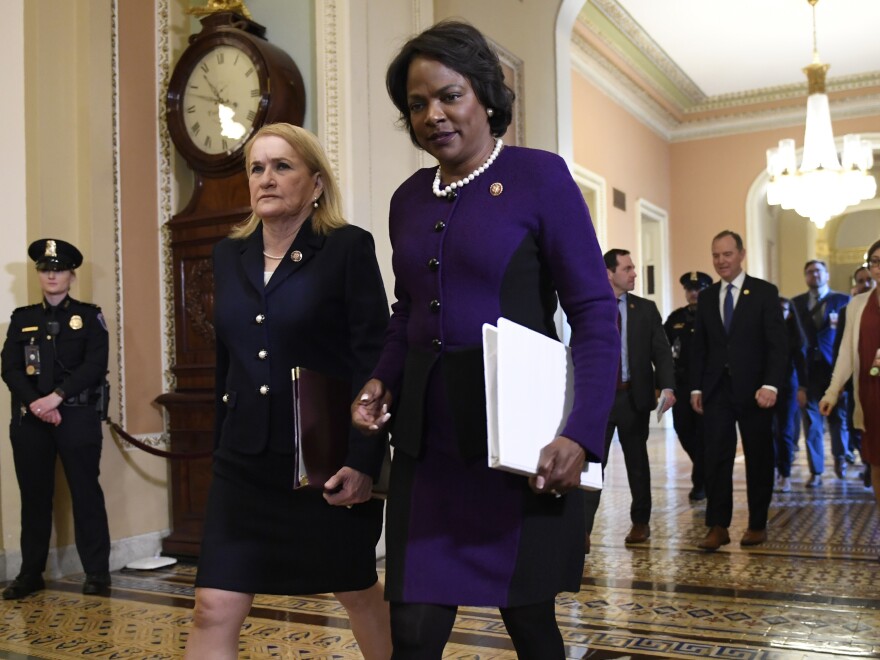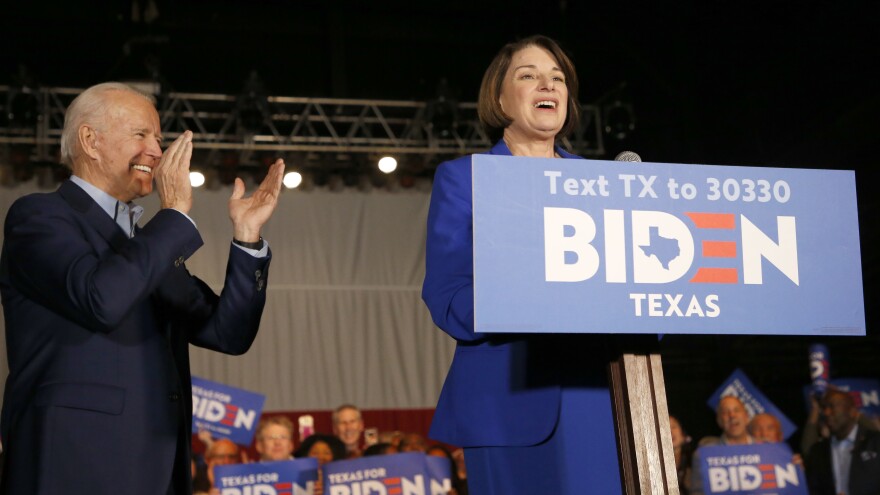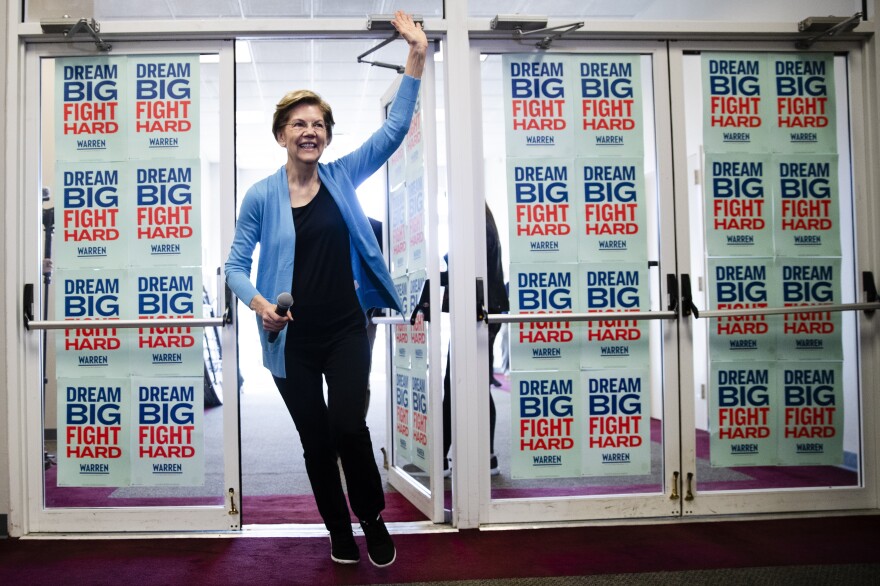Updated on June 11 at 9:30 p.m. ET
Presumptive Democratic nominee Joe Biden has vowed he will pick a woman to be his vice presidential running mate.
But which woman?
He's facing pressure to pick a black woman, but during the primary he also had relative deficiencies with Latino voters. He has to consider the progressive left, given that he was not progressives' preferred candidate and some of them didn't turn out for Hillary Clinton in the 2016 general election.
But he doesn't want to alienate the middle, either, as he looks to win over the narrow slice of persuadable voters in the country.
It's not an easy choice. Biden, a former vice president, has said he wants someone with whom he's "simpatico." Chemistry is vitally important in a vice president. She needs to be someone Biden can trust to have his back in hard times, and she needs to be someone with whom a potential President Biden can govern.
But there's more to it this year. The vice presidential selection process is usually fun to talk about. It even gets a cutesy nickname, the "Veepstakes." But the VP pick rarely matters, in terms of actually affecting the outcome of a presidential election.
This year might be different, though. Given Biden's age, this pick is perhaps the most consequential in decades. Biden will be 78 by the time he would be sworn in. That would make him the oldest president ever to assume the office.
So his VP pick needs to be ready on Day 1 to be president. And she, of course, has to fulfill that first rule of picking a running mate: First, do no harm.
Here, in alphabetical order, are some pros and cons of 11 of the people Biden might pick:
Stacey Abrams

Pros: The former Georgia gubernatorial candidate fires up progressives. For them, her close loss there in 2018 symbolizes what happens when the vote, especially of minorities, is suppressed. She's African American, outspoken and unafraid to make the case. The argument for Abrams goes that if the country is as polarized as it seems, and Clinton struggled to get out the base at the margins, Abrams might be able to help.
Cons: But Abrams also presents potential risk. She's not currently an elected official, and she hasn't been vetted on a national stage. Things like her having owed more than $50,000 in back taxes are sure to come up. She had the opportunity to run for president — and for one of two open Senate seats in Georgia this cycle — and she passed.
She's also rankled some with what looks like open lobbying for the job. She denies that she is, but she told The Atlantic, "I would put my capacity to win an election as the VP running mate alongside anyone's." That irritated some in the old guard, including Rep. William Clay of Missouri, who called her lobbying offensive. "You can't show up at the winner's window with loser's tickets and demand anything," he said.
Wisconsin Sen. Tammy Baldwin

Pros: Perhaps no state is more important in 2020 than Wisconsin. Democrats lost it narrowly in 2016, and it's the most conservative of the three former Blue Wall states Clinton lost, including Michigan and Pennsylvania. Baldwin has a lot of firsts to her name: She's the first woman elected to the House and also the Senate from Wisconsin; and she's the first openly gay person elected to the Senate.
She also has her own compelling story to tell when it comes to health care, as she had a "pre-existing condition" as a child that made it difficult for her family to get her care. So though she, unlike Biden, may prefer Medicare for All, she could make a good case for expanding coverage.
Cons: Baldwin isn't well known nationally and, perhaps more importantly, picking her would mean opening up a potentially vulnerable Senate seat after she just won reelection to it in 2018. Her seat would go to a special election in 2021. Imagine if Democrats have a great 2020 Senate run, take over the chamber, only to see it threatened months after taking control.
Florida Rep. Val Demings

Pros: The second-term Florida congresswoman got attention for her role as an impeachment manager in the trial of President Trump, and she gained that role because of her organization and sharp, clear style of arguing. She's disciplined, was Orlando's first female police chief and could have appeal in her crucial battleground state. Even doing better at the margins in Florida could seal the presidency for a Democrat.
Cons: While she's known in the I-4 corridor in Florida, it's not the same kind of swing area it used to be; it's trended far more Democratic. And she's not as tested statewide.
Additionally, her time as Orlando police chief has rankled some African American leaders, because though Orlando saw a drop in violent crime, the department paid out millions in damages after lawsuits related to false arrest and use of excessive force.
Illinois Sen. Tammy Duckworth

Pros: The Illinois senator has an incredible story to tell. She's an Army veteran who lost both of her legs when a helicopter she was piloting in Iraq in 2004 was shot down by a rocket-propelled grenade. She's the first disabled woman and first person born in Thailand (to a father who was an American citizen) elected to the Senate. And she had a baby at 50, the first senator to give birth in office.
So Duckworth is both a woman of color and from the Midwest (though not a battleground state). She also hasn't shied away from taking on Trump. "I will not be lectured about what our military needs by a five-deferment draft dodger," she said in 2018.
Cons: She is clearly in the moderate camp. "I don't think you can go too far to the left and still win the Midwest," she said after the 2018 elections. That cuts two ways — she might appeal to the middle, but likely wouldn't fire up the base.
New York Sen. Kirsten Gillibrand
Pros: The New York senator has taken a leading role on sexual assault, and she's backed Biden on the 1993 allegation of an assault made by a former staffer. That could help blunt any issues Biden might have on the subject.
Cons: But being from New York, there's no geographic diversity she'd bring, she isn't as much of a rock star on the left as, say, Elizabeth Warren, and she doesn't solve the issue of groups calling for Biden to pick a woman of color.
New Mexico Gov. Michelle Lujan Grisham

Pros: The New Mexico governor is the only Latina governor in the country, and a Latina on the presidential ticket would be historic. She has won praise from Democrats for her early action in her handling of the coronavirus pandemic. (Some Republicans say otherwise.) She has taken the fight to sheriffs in her state after passage of a so-called red-flag law that some said they might not enforce, and she took the fight to Trump on immigration.
In 2018, as chair of the Congressional Hispanic Caucus, she crashed a White House meeting on immigration to tell the president he was making it harder than it needed to be to get to a compromise on the Deferred Action for Childhood Arrivals program.
Cons: But she's also not well known nationally and wasn't particularly popular at home before the coronavirus, and she would have to be taken out of her current role in handling the pandemic to be on the ticket.
California Sen. Kamala Harris
Pros: The California senator is thought to have an inside track for a host of reasons. She ran for president, which means she's been vetted on the national stage; she's black, which would satisfy those who are urging Biden to pick a black woman; and there's a personal connection — she was close with Biden's son Beau.
The former prosecutor and state attorney general has a reputation as an incisive questioner and being able to make a clear argument. Envisioning her holding her own in a debate with Vice President Pence is not difficult.
Cons: She was criticized for a lack of a coherent message during her presidential run, but Biden's message would become hers. She doesn't necessarily fire up the progressive left, which doesn't love some of her past positions on criminal justice; she doesn't give any regional advantage — a ticket with an East Coast former senator and a senator from California doesn't exactly dispel the notion of Democrats not caring about the middle of the country; and it's not clear Harris has appeal to the middle of the electorate in places like the Upper Midwest.
Minnesota Sen. Amy Klobuchar

Pros: The Minnesota senator saw some late momentum in the Democratic primary before dropping out to consolidate support behind Biden. She impressed during the campaign with her quick wit on debate stages and on the campaign trail. She tries for cross-party Midwestern appeal, touting that she won reelection in 2018 by more than 20 points in a state Trump lost by only two points in 2016.
Cons: While Klobuchar has potential appeal in the Midwest, her more moderate views and approach do little to excite the base. She also had little strength during the primary with black and Latino voters, who are key parts of the Democratic Party.
Susan Rice
Pros: The Obama-era national security adviser and former United Nations ambassador is among the top Democratic foreign-policy experts in the country. She's African American and is someone Biden is comfortable with, given they served together in the Obama administration and foreign policy is a pet issue for both.
Cons: But she's never stood for elective office, making her readiness to be president a question mark, despite her foreign-policy credentials. What's more, her role in the Benghazi affair threatens to be a distraction off the bat, something someone at the top of the ticket can barely afford in their VP pick.
Massachusetts Sen. Elizabeth Warren

Pros: Democrats and the progressive left love Warren. She tops polls for who Democrats want Biden to pick. She knows the issues as well or better than anyone and would certainly be ready to govern. A Warren pick would indicate Biden wants to embrace the left and some of Warren's (and Bernie Sanders') policies and political approaches. Warren would not be someone who sits back as vice president — she'd want a portfolio and to work on the things important to her right away.
Cons: But Warren and Biden haven't always had a warm relationship (though she's said nice things about him lately). And she does nothing to appeal to the middle, has no regional advantage and isn't a woman of color.
Michigan Gov. Gretchen Whitmer
Pros: The Michigan governor has been thrust onto the national scene — and into controversy — with her stay-at-home rules during the pandemic. Biden's team would hope that Whitmer could appeal in the must-win Upper Midwest. If the verdict on Whitmer is that she handled the coronavirus crisis with competence, her stock would rise. Among Democrats, crisis management experience was the most desired quality in a Biden VP, according to a recent poll.
Cons: But the controversy doesn't necessarily help Whitmer's chances. Michigan has seen some of the most fervent protests, with armed men taking to the state capitol, and Trump has tweeted "Liberate Michigan." If she's seen as divisive and polarizing, that could hurt her chances of being selected. What's more, it's difficult to pluck a governor who is dealing with a crisis out of that post. And Whitmer might be seen as too green — she hasn't really been tested as a surrogate for Biden on a national stage.
Editor's note: This post originally included Sen. Catherine Cortez Masto of Nevada, but she has since withdrawn her name from consideration, saying she supports Biden but wants to focus on her state's economic recovery.
Copyright 2023 NPR. To see more, visit https://www.npr.org.




